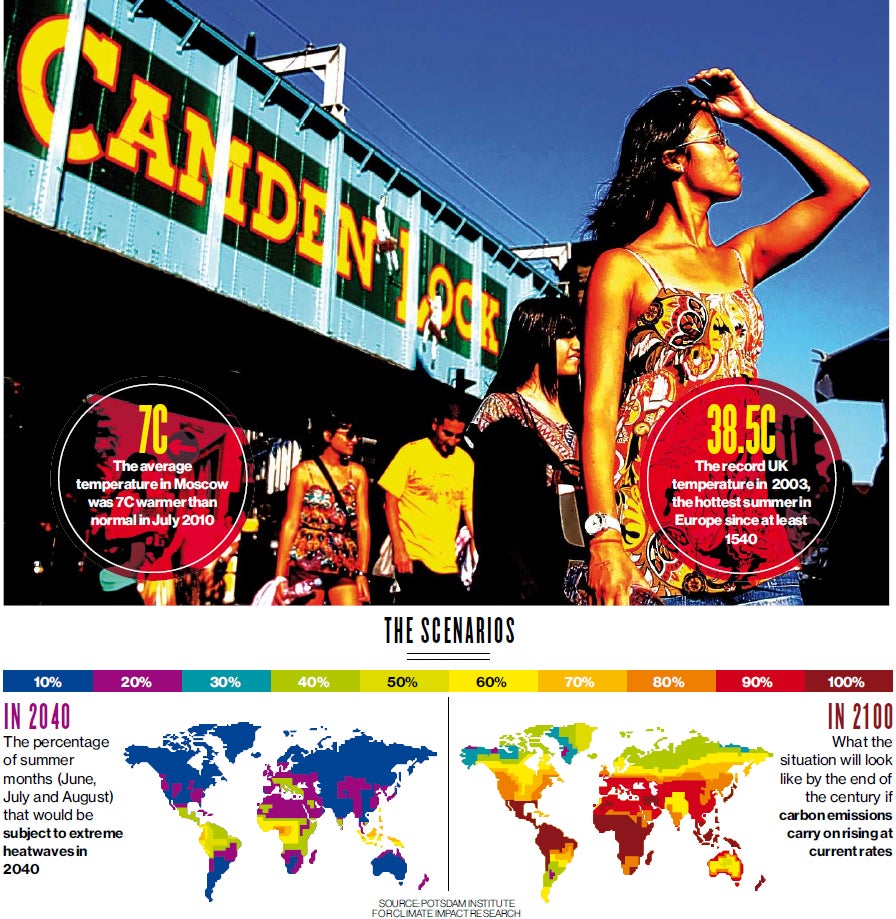Extreme heatwaves are predicted as the new normal for British summers by 2040
Report calls for dramatic curbs in greenhouse gas emissions and warns of threat to human society

Global temperatures are climbing so rapidly that by 2040 Britain will spend up to a fifth of its summer months in an extreme heatwave, a new report warns.
Click image above to enlarge graphic
Unless something dramatic is done to curb the volume of greenhouse gas emissions widely regarded as responsible for climate change, then conditions currently regarded as “extreme” will become the “new normal” in the UK and most of the world by the end of the Century, the findings say.
Under this scenario, by the end of the century Spain and France are likely to be experiencing extreme temperatures during 80 per cent of their summer - across much of June, July and August - with the UK slightly lower at between 50 and 60 per cent, according to Dim Coumou, the lead author of the study from the Potsdam Institute for Climate Impact Research.
For Britain, this would mean the July 2006 heatwave - the hottest month since records began in 1659 with an average temperature of 17.8C - would become normal.
“The tropics, the Mediterranean and the Middle East will be worst affected, but in the UK you will definitely see a very strong increase in heat extremes as well,” Mr Coumou said, adding that this would be hugely damaging to agriculture and health.
“Heat extremes can be very damaging to society and ecosystems, often causing heat related deaths, forest fires or losses to agricultural production. So an increase in frequency is likely to pose serious challenges to society,” Mr Coumous said.
The extreme heatwaves referred to in the report are known as “3-sigma” events. These are categorised by a hugely complex formula, which compares the average temperature over the course of a month with the average for that time and place for every year since the beginning of the 20th Century.
Technically, the chance of experiencing a 3-sigma event is roughly one in a hundred. However, given the impact of human-emitted greenhouse gases in recent decades, such events have gone from being virtually unheard of in 1950s to becoming increasingly common in the past decade, Mr Coumou said.
“A good example of a recent three-sigma event is the 2010 heat wave in Russia. In the Moscow region the average temperature for the whole of July was around 7C warmer than normal,” said Mr Coumou.
Other examples include the European heatwave of 2003, which was the hottest summer on record for the continent as a whole since at least 1540.
Last month, while cooler than July 2006, may also qualify as a 3-sigma heatwave, said Mr Coumou, who cannot confirm this because he has not finished analysing the data.
The report predicts that by 2020, a tenth of the world's land surface will be on the receiving end of a 3-sigma heatwave at any one time during the summer months - a figure that will double to a fifth by 2040. At the moment, 5 per cent of the world's land surface is affected in this way, compared to just 1 per cent in the 1960s.
The changes between now and 2040 will happen regardless of the amount of carbon dioxide that is pumped into the atmosphere over that period because there is typically a ten to 20 year time lag between greenhouse gases being emitted and the resulting warming of the planet, Mr Coumous says.
However, beyond 2040 the amount of carbon dioxide and other greenhouse gases emitted into the atmosphere in the coming decades will have a huge bearing on the frequency and intensity of heatwaves as they exacerbate climate change, he says.
If carbon emissions keep on growing then by the end of the century, 85 per cent of the global land area will be subject to extreme heatwaves during the summer months, the research found.
However, if emissions are severely curtailed, the frequency and severity of heatwaves would stable at 2040 levels, Mr Coumous said. This makes it extremely urgent to take decision action to curb climate change, he said.
The Potsdam report comes shortly after research linking a warmer world with droughts with a substantial increase in violent conflict between both individuals and entire societies. A review of 61 detailed accounts of violence published in the journal Science concluded that personal disputes and wider civil conflicts increase significantly with significant changes to weather patterns, such as increases in temperature and lack of rain.
Subscribe to Independent Premium to bookmark this article
Want to bookmark your favourite articles and stories to read or reference later? Start your Independent Premium subscription today.

Join our commenting forum
Join thought-provoking conversations, follow other Independent readers and see their replies